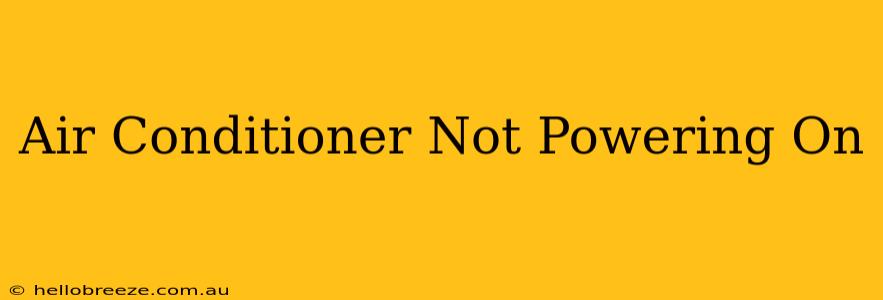Is your air conditioner refusing to turn on? A sweltering summer day just got a whole lot hotter. Don't panic! This comprehensive guide will walk you through troubleshooting common reasons why your AC unit might be failing to power up, helping you get that cool air flowing again. We'll cover everything from simple checks to more complex issues.
Quick Checks: The Easy Fixes
Before diving into more intricate solutions, let's start with the simplest steps. These often resolve the problem quickly and easily:
-
Check the Circuit Breaker: This is the most common culprit! Your AC unit likely has its own dedicated circuit breaker in your electrical panel. Is it tripped (switched to the "off" position)? If so, carefully switch it back to the "on" position. If it trips immediately again, there's a more serious electrical issue, and you should call a qualified technician.
-
Inspect the Power Cord: Examine the power cord connected to your AC unit. Look for any visible damage like fraying, cracks, or kinks. A damaged cord needs replacing; attempting to use a damaged cord is a safety hazard.
-
Check the Thermostat: Ensure the thermostat is set to the "cool" setting and that the temperature is set lower than the current room temperature. Try changing the batteries in your thermostat if it's battery-operated, as low battery power can sometimes prevent it from functioning correctly. Also, verify that the thermostat is receiving power; often a small indicator light will illuminate if it's getting power.
-
Remote Control Batteries: If you're using a remote control to operate your air conditioner, make sure the batteries are fresh. Low battery power in the remote can interfere with its ability to send signals to the unit.
More Advanced Troubleshooting Steps
If the quick checks didn't resolve the issue, let's move on to some more in-depth troubleshooting:
Condenser Unit Problems:
-
Overheating: The condenser unit (the outdoor part of your AC system) can overheat, causing it to shut down. Ensure there's adequate clearance around the unit (at least 2 feet on all sides) and that the condenser coils are clean and free of debris like leaves, grass clippings, or dirt. A dirty condenser unit significantly reduces efficiency and can lead to overheating and shutdowns. Consider cleaning it with a garden hose and a coil cleaning brush. Caution: Always unplug the unit before cleaning.
-
Frozen Evaporator Coil: A frozen evaporator coil (inside unit) prevents airflow and will shut down the system for protection. This often indicates a refrigerant leak or airflow problem. A technician is needed in this case.
Electrical Issues:
-
Capacitor Problems: Air conditioners use capacitors to start and run the compressor. A faulty capacitor can prevent the unit from starting. This is a job for a qualified HVAC technician. They possess the necessary expertise and safety equipment to handle electrical components. Attempting capacitor repair without experience is incredibly dangerous.
-
Compressor Failure: The compressor is the heart of the AC system. A faulty compressor will prevent the unit from working. Again, this requires professional diagnosis and repair.
When to Call an HVAC Technician
While many minor issues can be addressed with basic troubleshooting, some problems require the expertise of a qualified HVAC technician. Don't attempt advanced repairs yourself if you're not comfortable working with electricity or refrigerants. Here are some situations where professional help is essential:
- The circuit breaker keeps tripping.
- You suspect a refrigerant leak.
- The compressor isn't working.
- The unit is making unusual noises.
- You see signs of water leaks.
- You’ve tried basic troubleshooting, and the unit is still not working.
Calling a professional is crucial for safety and to ensure the longevity of your air conditioner. They possess the knowledge and tools to properly diagnose and repair the problem, preventing further damage or injury.
Remember, maintaining your air conditioner regularly can help prevent many of these issues. Regular filter changes, cleaning of the condenser unit, and annual maintenance checks by a professional will keep your AC running smoothly and efficiently throughout the hot summer months.

